CBD vs. CBN: Differences, Commonalities and Benefits
Summarize
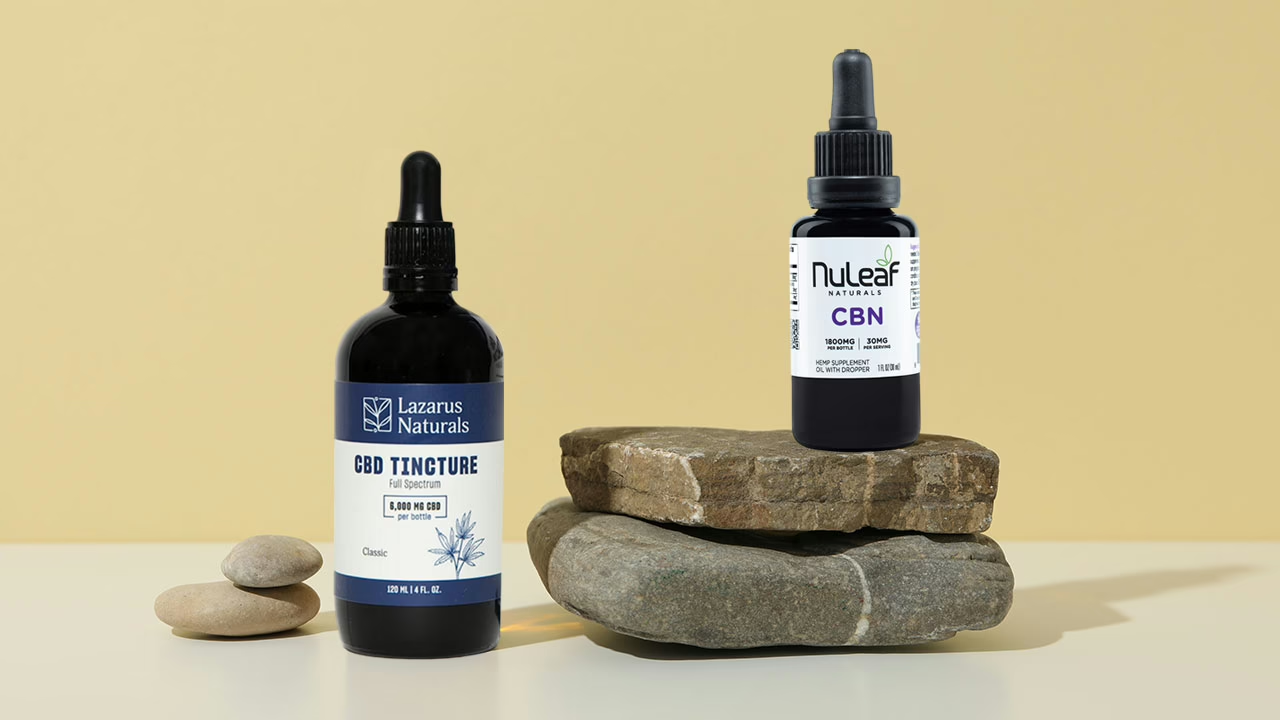
Say the word “cannabinoid,” and most people think of CBD or THC. These are the cannabinoids that have received the most attention from researchers, and brands have developed a wide range of CBD products that contain less than 0.3% THC. However, the hemp plant used to source CBD contains many other cannabinoids, like CBN, that current research is demonstrating may also have benefits. What’s the difference between CBD and CBN? What do they have in common, and are there different potential side effects?
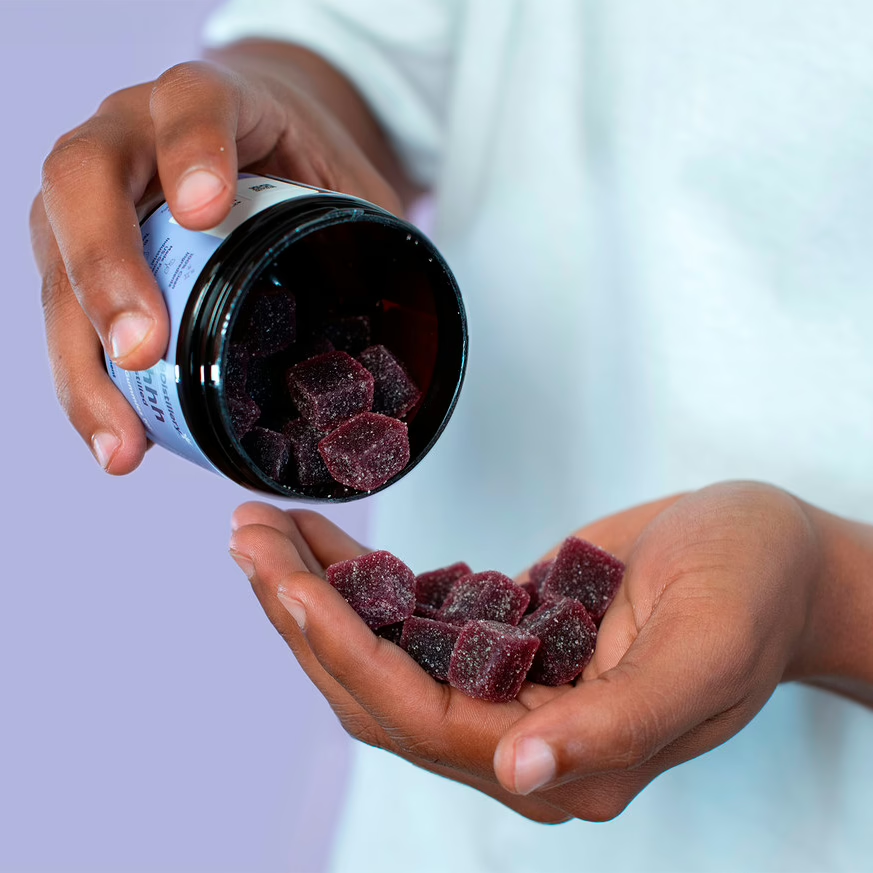
TL;DR (Too Long; Didn’t Read):
CBD is a major cannabinoid, while CBN is a minor one. There is more research available on CBD, while CBN research is minimal. However, both cannabinoids impact the endocannabinoid system, though in different ways, and may provide many benefits. Both are considered safe, and potential side effects are usually minimal.
Table of Contents
What is CBD?
CBD (cannabidiol) is a major cannabinoid found in the hemp plant, a type of cannabis plant. It interacts with the CB1 and CB2 receptors in the endocannabinoid system, and research has demonstrated that it may have potential therapeutic benefits. CBD is available in products like tinctures, gummies, capsules and softgels, creams, and lotions.
What is CBN?
CBN (cannabinol) is another cannabinoid found in the cannabis plant. It is formed when acidic cannabinoids (precursors) go through decarboxylation. This is a chemical process in which THCA converts to THC, which degrades into CBN through oxidation. Another natural source of CBN is when THCA forms CBNA, which also degrades into CBN through oxidation. Since THC is one of the most abundant cannabinoids in the cannabis plant, most CBN comes from the degradation of THC.
Either way, decarboxylation refers to the process in which raw cannabis is exposed to oxygen and heat for an extended period, triggering oxidation. The conversion is a natural plant aging process that occurs while the plant grows naturally and is exposed to ultraviolet light and oxygen. The longer the cannabis plant ages, the higher the amount of CBN. CBN is also formed when producers heat cultivated cannabis plant material.
How Do CBD and CBN Work in the Body?
The endocannabinoid system (ECS) is a biological signaling structure with receptors regulating hunger, sleep, memory, and more. It is activated naturally by endocannabinoids produced by your body. However, phytocannabinoids, like CBD and CBN derived from plants, can also activate the ECS. CBD and CBN are extracted from the hemp plant, a type of cannabis plant with less than .3% THC.
The CB1 receptors are mainly located in the central nervous system (CNS), with high levels in the brain. The CB2 receptors are present mainly in the immune system, which is regulated by the peripheral nervous system (PNS).
CBD has a low affinity for the ECS receptors CB1 and CB2 in the ECS system. It increases the body’s natural endocannabinoids called anandamide and 2-AG. The increase results from CBD modulating the enzymes that break down the natural endocannabinoids. The rise in anandamide and 2-AG means more is available to active cannabinoid receptors.
CBN binds to CB1 and CB2 receptors but is considered a weak CB1 agonist. This means it activates the receptors less than THC, which is why it has a less psychoactive effect than THC. CBN has a stronger affinity for CB2 receptors, which are expressed mainly in immune cells.
More research is needed to understand how CBD and CBN work in the body. There is currently a lot more research available for CBD than CBN.
CBD vs CBN: What Are the Differences?
When comparing CBN vs. CBD, what are the differences?
CBD
CBD research has found that this cannabinoid may have many potential positive impacts. The FDA approved a CBD-based prescription medication called Epidiolex in 2018. Researchers are finding the increasing significance of CBD for treating neurological conditions. Based on research and anecdotal evidence, CBD is believed to have many potential benefits. The following are some characteristics of CBD that make it different from what is known about CBN.
- Completely non-psychoactive
- A major cannabinoid that is abundant in hemp plants
- It may reduce some of the psychoactive effects of THC
- Primarily interacts with CB2 receptors in the ECS
- It may act as an appetite depressant
- It has been researched much more than CBN
CBN
While CBN research is still in its early stages, one of the most promising benefits is its potential to enhance sleep quality. It is often called the “sleepy cannabinoid” due to its reported drowsiness-inducing effects. A study involving rats found that CBN increased total sleep time, which could be particularly significant given that over half of the population reports sleep issue symptoms. This potential for improving sleep quality is just one of the many areas where further research could reveal the full extent of CBN’s benefits.
CBN may have other positive impacts, but more research is needed. Some other potential benefits of CBN that minimal research has suggested include the following.
- Analgesic capabilities
- Antibiotic
- Appetite stimulation
- Stimulation of bone growth
Following are some characteristics of CBN suggested by research to date that make this cannabinoid different from CBD.
- It has a psychoactive potency that is one-fourth that of THC so that it may be mildly intoxicating.
- The amount of CBN in a cannabis plant depends on the hemp plant’s age since exposure to heat and oxygen for a period is necessary to form CBN.
- It may increase THC’s effect, but there is conflicting research.
- Binds to CB1 and CB2 receptors in the ECS.
- It seems to have more potent sedative effects.
- It may act as an appetite stimulator.
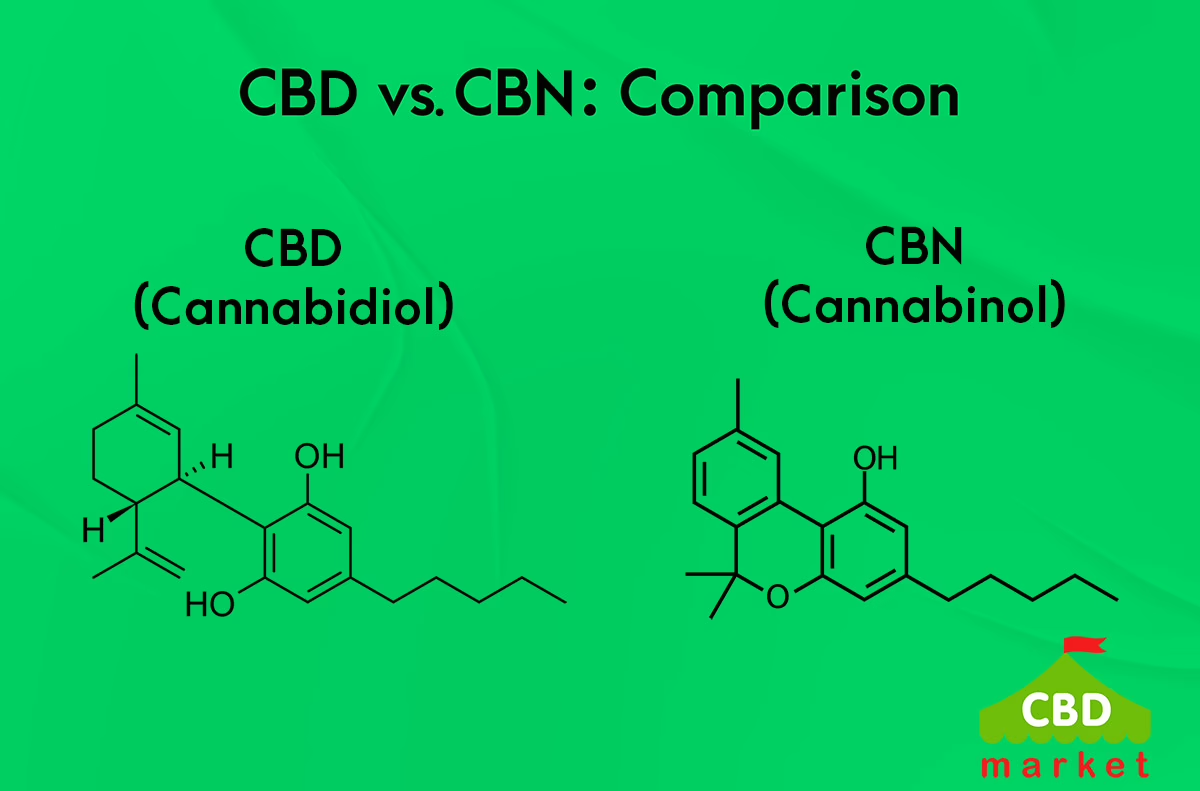
CBD vs CBN: How Are They Common?
There are also some commonalities when comparing CBN vs. CBD.
- Both cannabinoids are sourced from cannabis plants and are naturally occurring compounds.
- They interact with the endocannabinoid system.
- Both are studied for their effects on sleep support.
- CBD and CBN are legal if derived from hemp with less than 0.3% THC.
- Both are available in various product types.
- CBD and CBN products are available in three spectrums: full spectrum, broad spectrum, and isolate.
- Additional CBN is added to various CBD products to enhance the effects.
- They may have some similar side effects.
CBD vs CBN Comparison Chart
| Category | CBD (Cannabidiol) | CBN (Cannabinol) |
|---|---|---|
| Prevalence | Major cannabinoid in hemp plants. | A minor cannabinoid, which forms primarily from THC oxidation over time. |
| Scientific Research | Extensive clinical and human studies show well-established effects. | Limited studies, mostly preclinical or anecdotal; more emerging research needed. |
| Mechanism | Weak affinity to CB1 and CB2; acts indirectly, modulating other receptors. | Low-affinity partial agonist at CB1 and CB2; stronger binding than CBD but far less psychoactive than THC. |
| Primary Use Cases | Calm, relief, general wellness. | Sleep support, possible appetite stimulation, neuroprotective potential. |
| Side Effects | Generally well tolerated; possible fatigue, dry mouth, appetite changes. | Mild sedative; tolerable side effects similar to CBD. |
| Psychoactivity | Non-psychoactive; doesn’t produce a high. | Mildly psychoactive at high doses; generally minimal effects compared to THC. |
| Entourage Effect | Works synergistically with other cannabinoids and terpenes. | Legal under the same hemp-derived thresholds; not controlled if THC content remains low. |
| Legal Status | Federally legal if derived from hemp (<0.3% THC) | Federally legal if derived from hemp (<0.3% THC). |
CBD vs CBN: What Are the Risks and Side Effects?
Any compound people consume has risks and potential side effects.
CBD
Some people have experienced the following side effects from CBD.
- Drowsiness or fatigue
- Nausea
- Diarrhea
- Low appetite
- Irritability
- Dry mouth
- Interactions with some medications
Women who are pregnant should not use CBD. Also, unless you purchase CBD products from high-quality brands, there is a risk that the product label is inaccurate regarding the potency of cannabinoids or the types of ingredients. Another risk is the product contains harmful contaminants.
CBD is considered safe. The World Health Organization stated in 2018 that it has a good safety profile, and any potential side effects are mild.
CBN
CBN research is sparse, but consumers have reported mild side effects. In addition, human studies conducted between 1973 and 1987 involved taking up to 1,200 mg of CBN daily for up to four weeks. No safety concerns were noted.
Many potential CBN side effects are similar to the side effects of CBN.
- Drowsiness
- Sleepiness
- Dizziness
- Nausea and vomiting
- Morning grogginess
- It may make some people feel high if combined with THC
- It may interact with some medications, including blood thinners, sedatives, and opioids
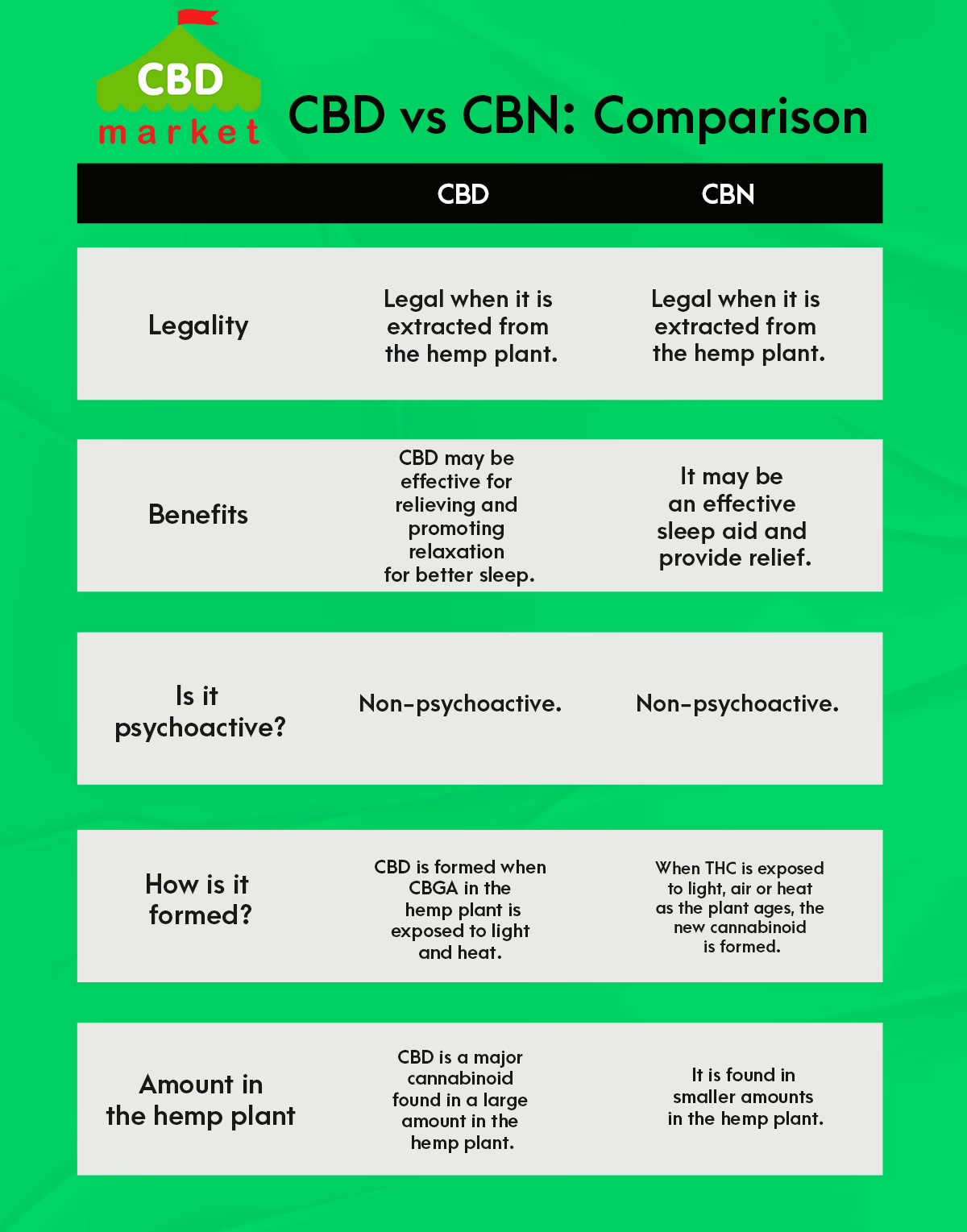
CBD vs CBN: Which Should You Use?
CBD is a good choice because of its potential to promote overall wellness, sleep, relaxation, and mild relief at night.
However, many products combining CBD and CBN promote more substantial relaxation, better sleep, and other potential effects due to their synergetic effects.
FAQs
Can You Mix CBD and CBN?
You can mix CBD and CBN. Full spectrum and broad spectrum products may contain both CBD and CBN. There are also CBD products that contain extra amounts of CBN.
It is believed that cannabinoids work together in the entourage effect. You may experience more significant effects than taking them alone in an isolate product.
Why Is CBN More Expensive Than CBD?
CBN is more expensive than CBD because it is a minor cannabinoid found in tiny amounts in cannabis plants, unlike CBD, which is abundant. Since CBN naturally occurs as THC degrades over time, its extraction from fresh plants is limited. Since it is present in minimal concentrations, large amounts of plant material are required to obtain a small amount of this compound, making extraction less efficient and more costly.
Unlike CBD, which can be directly extracted from hemp in large quantities, obtaining CBN in the desired amounts often requires additional processing steps, including oxidation or conversion from THC. This increases costs for manufacturers.
Does CBD Work Better Than CBN for Relief?
The kind of relief sought determines whether CBD or CBN works best. If you are looking for potential relief from anu discomfort, CBD is likely the best choice. It also will not make you drowsy.
If you are looking for relief from poor sleep quality or for relaxation, CBN may work better.
However, when looking for relief from workouts, a combination of CBD and CBN may work best.
Is CBD or CBN Better For Sleep?
CBN is likely better for sleep because of how it works in the ECS. However, CBD formulations for sleep often combine CBD and CBN with other ingredients like melatonin. CBD.market has a full range of products containing both cannabinoids.
Understanding the Power of Cannabinoids
As research continues into CBD and CBN, it becomes more evident that cannabinoids may have the potential to offer therapeutic benefits. Approximately 33% of adults have used CBD, and 64 million have tried it in the last 24 months. A survey found that 72% had heard of CBD, 21% had used CBD in the past year, 17% had heard of CBN, and 4% had used it in the prior 12 months.
Based on consumer reviews, the increasing consumption of cannabinoids is due to the fact cannabinoids are helping millions of U.S. adults with various wellness issues so they can live a higher quality of life. It is crucial to buy from reputable producers who make the Certificate of Analysis easily accessible. Cannabinoids are proving to be potent, natural, safe compounds that give people alternatives to many over-the-counter medications.
Sources
- https://www.mdpi.com/1422-0067/25/8/4204
- https://pmc.ncbi.nlm.nih.gov/articles/PMC10586905/
- https://www.nature.com/articles/s41386-024-02018-7
- https://www.psychologytoday.com/intl/blog/sleep-newzzz/201908/research-shows-9-potential-health-benefits-cbn
- https://www.aamc.org/news/cbd-does-it-work-it-safe-it-legal
- https://pmc.ncbi.nlm.nih.gov/articles/PMC10450062/
- https://www.singlecare.com/blog/news/cbd-statistics/
- https://www.michiganmedicine.org/health-lab/growing-use-hemp-derived-alternative-cannabis-products-containing-cbd-delta-8-thc-cbg-cbn
Share this post


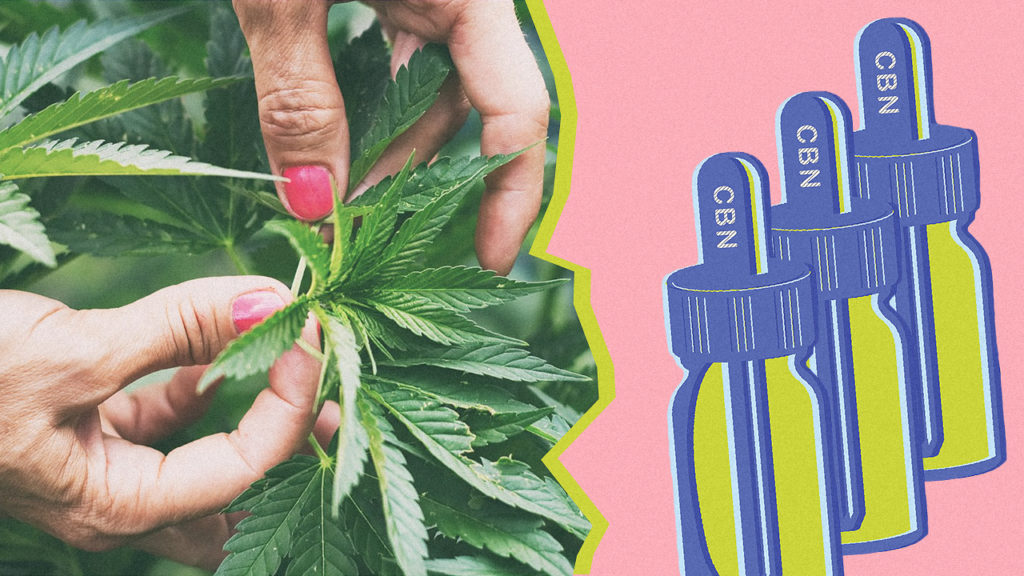

0